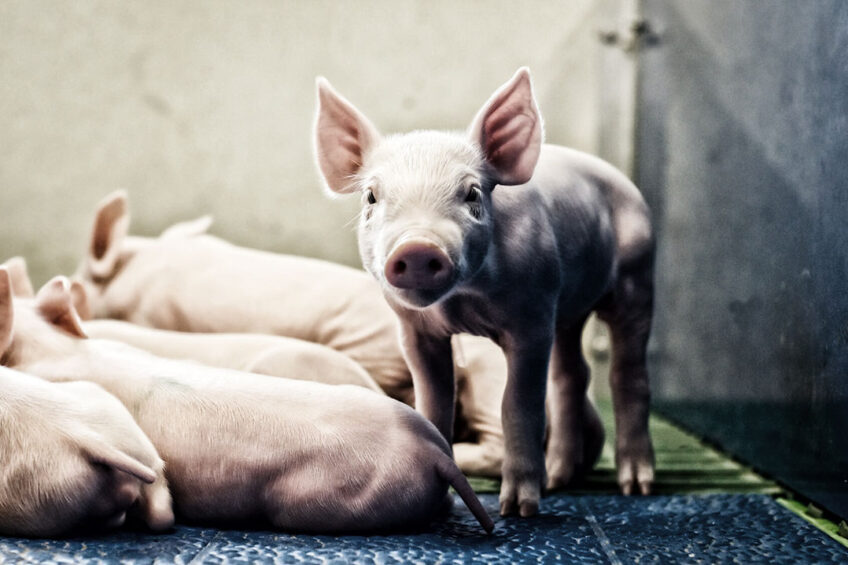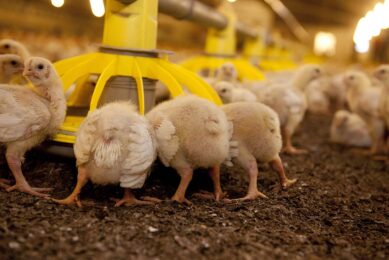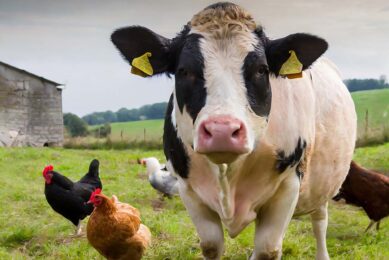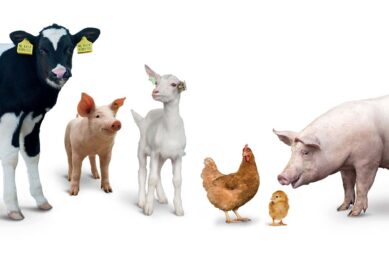Supporting intestinal health in a natural way

The antimicrobial activity of different fatty acids is well known in practice. Extensive improvement of gut health and reduced use of antibiotics can be reached with targeted combinations of fatty acids and other substances.
Due to the legally required reduction of antibiotics in livestock farming, different fatty acids are playing an increasingly important role in animal nutrition. The search for alternatives to antibiotics in swine production has increased the interest in medium-chain fatty acids (MCFA) due to their strong antibacterial activity and energy-supplying ingredients. Villi growth is positively influenced, which increases the digestibility of the feed and can also improve postweaning gut development. In addition, the use has proven itself due to the stabilisation of health and performance, especially in demanding feeding phases in pig husbandry. The broad spectrum of activity of MCFA has been shown to inhibit Gram-positive bacteria in the animals’ digestive tract. The infection pressure on the animals, triggered by pathogenic germs specific to pigs (Streptococcus suis, Escherichia coli, Salmonella sp. and Clostridium perfringens), is a main reason for the use of antibiotic medicines. The aim is to suppress the undesirable bacteria by adding MCFA to the feed and thereby promote the development of desirable bacteria in the intestine. However, bacteria such as streptococci are not pathogenic for pigs per se. They are part of the pigs’ natural micro flora and are therefore also found to a greater extent in healthy pigs.
Optimal and maximum growth in pigs
A mature and stable immune system of the animal forms the basis for optimal growth and for exploiting the maximum growth potential. For this, the pig needs a sufficient defence against pathogenic germs, since bacteria are the cause of many problems in pig farms. In this context, MCFA can naturally have a positive effect on colonisation of the intestine as they can be utilised by the gut cells to improve gut development and integrity. Many in vitro studies show pronounced antibacterial effects against both Gram-negative and Gram-positive germs when using different fatty acids. The antibacterial effect of MCFA on pig-specific bacteria is different. Lauric acid (C12) is considered a particularly active antibacterial agent. Primarily it is active against Gram-positive pathogenic and spoilage bacteria. The areas of application and the effects of the respective acids are very different, so that a specific selection and combination of acids can produce synergistic effects. The effect can also be enhanced with phytogenic additives such as essential oils and their extracts.
OPENING THE DOOR TO GRAM-POSITIVE BACTERIA
Bewi-Fatrix SynerG+, produced by Bewital Agri, is a matrix-encapsulated combination product based on lauric acid and plant extracts. The lauric acid used acts as an activated component that selectively inhibits Gram-positive bacteria. Lauric acid as a free fatty acid can only infiltrate into the bacterium cell to a limited extent. Therefore, the SynerG+ factor, a combination of the active ingredients, helps to open the Gram-positive bacteria (serving as a door opener). The lauric acid can penetrate the cell and bring about over-acidification of the cell, so that it dies off (Figure 1).
Figure 1 – Penetrating and destroying the lipid layer of Gram positive bacteria.
Current results from the field
The antimicrobial potential of different combinations of fatty acids has already been tested in practice many times. The products are widely used on pig farms with an increased incidence of streptococcus and/or clostridia infections. In a field trial the influence of a specific matrix-encapsulated combination product was examined. On a Dutch farm with 500 sows, the farm manager reported acute failures both before and after weaning. Both in the sows and in the piglet herd the veterinarian confirmed the increased streptococcus problem. The effect of Bewi-Fatrix SynerG+ on piglet losses and the biological performance of the sows was tested on the farm. In the trial phase, the sows were given 12 g Bewi-Fatrix SynerG+ per sow a day as a top dressing starting 7 days before until 4 days after farrowing. In addition, the combination product was dosed at 4 kg/mt in the piglet rearing feed. The following parameters were evaluated: Losses in the suckling phase, losses in the flat deck, total piglet losses, weaned piglets per litter and weaned piglets per sow and year. The results (Figure 2) show a clear reduction in piglet losses. This is especially the case for the suckling piglet phase, where losses could be reduced from 11.1% to 8.0%. Overall, piglet losses were reduced from 14.4% to only 10.7%. The weaned piglets per litter could be increased by 0.4 and weaned piglets per sow and year by 1.1 piglets, which has a direct effect on the profitability of the farm. Not taken into account in this case are the increased biological performances due to the improved health status of the animals, which have an effect also on the fattening period.
Plant-based solution
The different fatty acids have become established especially for latent problems with Gram-positive bacteria such as streptococci and clostridia. The combination product Bewi-Fatrix SynerG+ also shows synergistic effects, which is proven by a current field trial and further in vitro analyses. Due to the positive influence on the intestinal development and microbiota in piglets and its antimicrobial properties, the health status of the animals is positively influenced. The risk of infection with streptococci, clostridia and other infections is significantly reduced. The use of purely plant-based ingredients can therefore contribute to a significant reduction in the use of medicines on farms.
Author:
Dr Ralph Schemmer, Bewital Agri
 Beheer
Beheer







 WP Admin
WP Admin  Bewerk bericht
Bewerk bericht